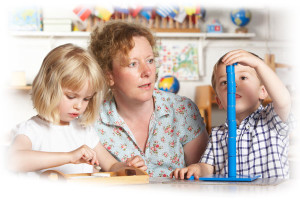Mentor, Model, Guide
Montessori education addresses the whole child: his physical, social, emotional, and cognitive growth. As well as helping each child become an independent learner, the teacher helps turn his attention outward, fostering community, collaboration, and respect for the dignity of others.
Teachers educated in the Montessori Method bring distinctive skills to the task. Their quiet orchestrations lead to magical moments as young children exclaim “I learned it myself!”—and older students think it.
Called a “directress” by Montessori Method founder Dr. Maria Montessori (back in the day when teachers were mostly women!), and sometimes known as a “guide,” the Montessori teacher plays many roles as she directs, or guides, her students.
Skilled Observer: Through careful observation, the Montessori teacher comes to know each student’s interests, learning style, and temperament. He understands the student’s developmental needs, and is receptive to her “sensitive periods,” when she is most ready to learn a new concept or skill.
With this information the teacher chooses materials and lessons that will capture the student’s attention and entice her to learn. When he observes that the student has mastered a concept or skill, he introduces new lessons that become increasingly complex and abstract.
Creative Facilitator: The teacher serves as a resource as students go about their work. She offers encouragement, shares their triumphs, and steers them to greater understanding.
She helps them advance through the curriculum as they master new skills, so they are continually challenged and eager to learn.
As students progress, the teacher modifies the classroom environment, adjusting the learning materials to meet the students’ changing needs.
Character Builder: A Montessori class is a close-knit community, fertile ground for nurturing the qualities that help children and youth become citizens of the world and stewards of the planet.
By his own behavior and attitudes, the teacher models values such as empathy, compassion, and acceptance of individual differences. Teachers encourage the students to be courteous and kind. They also bring students together in collaborative activities to foster teamwork, responsibility, self-discipline, and respect.

